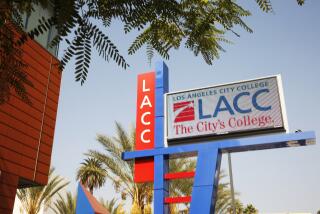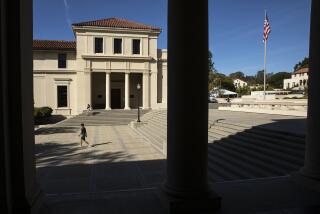Small Maine College Focuses on the Study of Human Ecology
- Share via
BAR HARBOR, Me. — It is the only fully accredited college in America offering just one degree--a bachelor of arts degree in human ecology.
In its 15th year, tiny College of the Atlantic on 25 acres of prime shoreline on Mount Desert Island has a student body of 135 young men and women who have come here from throughout the nation.
With 11 full-time and eight part-time faculty, all Ph.D.s, the school has an eight-to-one student-faculty ratio.
“Six local residents of Bar Harbor in 1969 decided what their community needed was a small college, a school that would be very special and very different,” explained COA’s president Louis Rabineau, 62.
“All over the country there were concerns about the environment. ‘That’s it,’ they decided. The school’s entire purpose of being would be ‘How to figure out how to deal with the environment.’ There would be only one degree offered, a degree in ecology, human ecology.”
College of the Atlantic was launched in 1972 and ever since students have come to Bar Harbor to study a wide variety of courses, each with an ecological twist.
There are classes on such subjects as plant and animal ecology, evolution, anatomy, physiology, marine biology, ornithology, math, chemistry, painting, ceramics, sculpture, philosophy, literature, history, economics, law, public policy, anthropology and education.
So, what is human ecology? It’s the re-examination of traditional arts and sciences in light of contemporary thought, said Rabineau. A study of systems natural and human-made that tie people to their environments. A study of human problems.
“It’s interrelation and interdependence of all things, living things one to another, people to people, people to other things,” was the way Ed Kaelber, COA’s first president put it.
The school encourages students to examine issues from many perspectives and to seek solutions that reflect an integrated perspective.
Students are encouraged to talk back, to challenge authority, to investigate assumptions, to enter into dialogue with teachers who are engaged in questioning accepted knowledge and making innovative connections to other fields.
The small classes are characterized by spirited debate and discussion.
“We’re encouraged to design our own courses when a class we’re interested in isn’t offered,” said Kirsten Triplett, 23, of Manhattan. “I wanted to learn about ethno-botany, the importance of plants to a culture. It wasn’t taught.”
She worked with a teacher to create her own class in ethno-botany, gathered a bibliography, read 10 books on the subject and did a great deal of other research, much of it at Harvard University during the Christmas break.
Phil Girton, 27, of Binghampton, N.Y., came to COA after spending six years in the Navy as a second-class machinist’s mate and later working as a lab technician at a nuclear power plant.
“I like the hands-on aspect of education here, being able to do things instead of just reading about something in a book,” he said.
Forty percent of the students have transferred to COA from other schools; 70% who enroll graduate and 30% of the graduates go on to get their masters and doctoral degrees.
“A number of our graduates go into environmental work, into law, teaching, a couple have become clergy and a goodly number have set up businesses,” said Rabineau.
Students play a big role in decision-making at the school. The college is run by committees and students are committee members. When a search for a new college president was made two years ago, candidates for the position were presented to the students as well as faculty, staff and trustees.
Two international convocations of scholars and practitioners of human ecology from 27 nations have been held on the COA campus. And, now there are colleges of human ecology at Cornell, Michigan State, the University of Maryland and Connecticut College.
Allied Whale, a research arm of the College of the Atlantic, was formed in 1973 by Steve Katona, 43, a professor at COA since the school started. It is one of the most prestigious whale research programs in the nation.
Whale of a Catalogue
With the help of biologists, observers and operators of whale watch boats up and down the Atlantic Coast, Allied Whale has put together the North Atlantic Humpback Whale Catalogue, files of descriptions, sightings and individual photographs of more than 4,000 of the marine mammals.
Allied Whale is now starting a catalogue of thinback whales and to help support the project has an adopt-a-whale program where for $25 a person may adopt a thinback and in return receive a color photograph of the whale plus a brief history of the animal.
College of the Atlantic has circulated its 24-foot-long skeleton of Dinky the Minke whale to schools in every county in Maine. More than 11,000 students have put together the giant puzzle of Dinky’s skull and bones sent out by the school in scrambled pieces as a traveling anatomy learning game.
The Minke whale, smallest of the baleen whales off the coast of Maine, died in 1979 when entangled in a lobster line.
On Mount Desert Rock, a remote 3 1/2-acre island 25 miles off the coast of Maine, the college operates the oldest land-based marine mammal research facility on the East Coast.
Photo identification and behavior studies of passing whales are conducted here by faculty and students as well as inventories of migratory birds and other wildlife.
More to Read
Sign up for Essential California
The most important California stories and recommendations in your inbox every morning.
You may occasionally receive promotional content from the Los Angeles Times.













